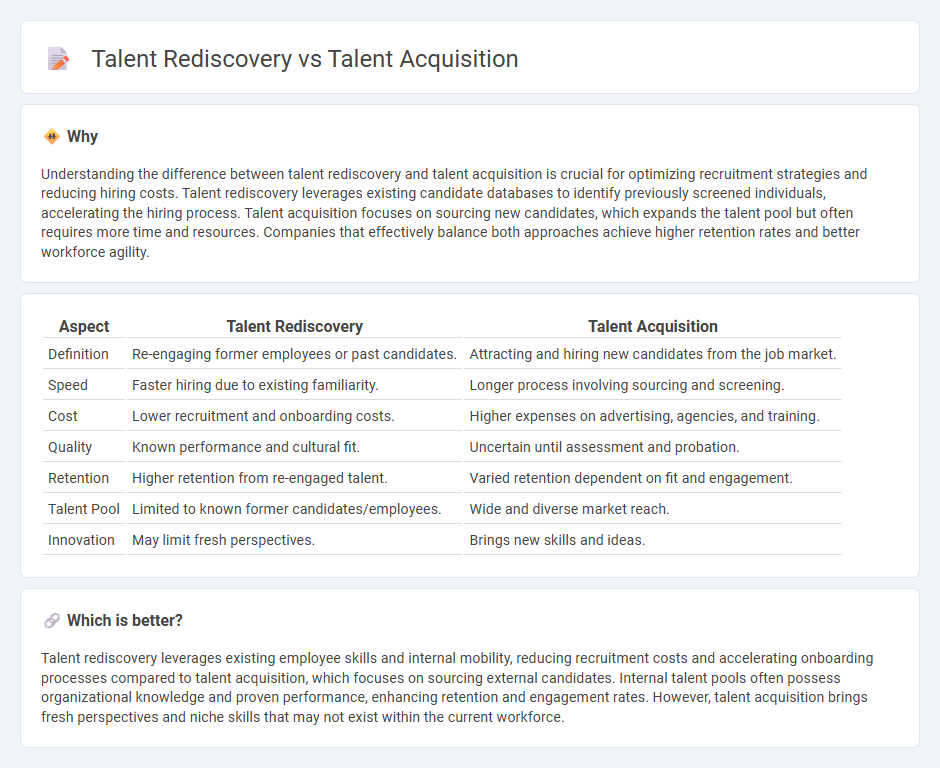
Talent rediscovery leverages existing employee data to identify hidden skills and potential within the current workforce, enhancing internal mobility and reducing recruitment costs. Talent acquisition focuses on sourcing new candidates externally to fill skill gaps and bring fresh perspectives into an organization. Explore how integrating talent rediscovery with acquisition strategies can optimize workforce planning and boost overall productivity.
Why it is important
Understanding the difference between talent rediscovery and talent acquisition is crucial for optimizing recruitment strategies and reducing hiring costs. Talent rediscovery leverages existing candidate databases to identify previously screened individuals, accelerating the hiring process. Talent acquisition focuses on sourcing new candidates, which expands the talent pool but often requires more time and resources. Companies that effectively balance both approaches achieve higher retention rates and better workforce agility.
Comparison Table
| Aspect | Talent Rediscovery | Talent Acquisition |
|---|---|---|
| Definition | Re-engaging former employees or past candidates. | Attracting and hiring new candidates from the job market. |
| Speed | Faster hiring due to existing familiarity. | Longer process involving sourcing and screening. |
| Cost | Lower recruitment and onboarding costs. | Higher expenses on advertising, agencies, and training. |
| Quality | Known performance and cultural fit. | Uncertain until assessment and probation. |
| Retention | Higher retention from re-engaged talent. | Varied retention dependent on fit and engagement. |
| Talent Pool | Limited to known former candidates/employees. | Wide and diverse market reach. |
| Innovation | May limit fresh perspectives. | Brings new skills and ideas. |
Which is better?
Talent rediscovery leverages existing employee skills and internal mobility, reducing recruitment costs and accelerating onboarding processes compared to talent acquisition, which focuses on sourcing external candidates. Internal talent pools often possess organizational knowledge and proven performance, enhancing retention and engagement rates. However, talent acquisition brings fresh perspectives and niche skills that may not exist within the current workforce.
Connection
Talent rediscovery leverages existing candidate databases and AI algorithms to identify high-potential individuals previously overlooked or inactive, enhancing talent acquisition efficiency. Integrating rediscovered talent pools with active talent acquisition strategies reduces time-to-hire and recruitment costs while improving hiring quality. Employing talent rediscovery platforms supports data-driven decision-making, optimizing workforce planning and aligning talent acquisition with organizational goals.
Key Terms
Recruitment
Talent acquisition concentrates on sourcing and hiring new candidates to fill organizational roles, leveraging strategies like job postings, employer branding, and candidate assessments. Talent rediscovery emphasizes re-engaging past applicants or former employees whose profiles match current job openings, optimizing existing talent pools to reduce recruitment costs and speed up hiring. Explore deeper insights into how integrating both approaches can enhance recruitment efficiency and talent management.
Skills Inventory
Talent acquisition focuses on sourcing new candidates to fill skill gaps, while talent rediscovery leverages an existing skills inventory to identify qualified internal employees. Utilizing a comprehensive skills inventory streamlines the redeployment of talent, reduces hiring costs, and accelerates project timelines. Explore how optimizing your skills inventory can transform workforce agility and improve talent management outcomes.
Internal Mobility
Talent acquisition focuses on attracting external candidates to fill open positions, while talent rediscovery leverages internal mobility by identifying and promoting existing employees with unmet potential. Internal mobility enhances employee engagement, reduces hiring costs, and accelerates career progression by tapping into the organization's current talent pool. Explore how implementing talent rediscovery strategies can transform your workforce and boost organizational performance.
Source and External Links
Talent Acquisition: The Ultimate Guide - AIHR - Talent acquisition is the process of identifying, attracting, selecting, and retaining highly qualified people, using strategies such as Build, Buy, Borrow, and Bridge to meet organizational goals and avoid talent shortages.
What is Talent Acquisition? Tips & FAQs - SmartRecruiters - Talent acquisition involves aligning planning across departments to attract and hire the best candidates, developing employer branding, and managing the entire candidate life cycle from application to onboarding to retain key employees.
Talent Acquisition | How Does it Work? (Explained) - ADP - Talent acquisition is a strategic process consisting of creating networks, recruiting best-fit candidates with compelling branding and competitive compensation, interviewing, and onboarding to ensure high-quality hires tailored to specific organizational needs.
 dowidth.com
dowidth.com